Tony Blair’s Journey
When a high-profile politician is in office, self-disclosure comes at too high a price, however carefully orchestrated it might be. But now that Blair has left 10 Downing Street, the former British prime minister is telling his story—and trying to protect his legacy—in a new memoir.Now that the former British prime minister has left 10 Downing Street, he's telling his story—and trying to protect his legacy—in a new memoir.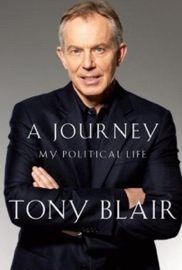
This review originally appeared in The TLS, whose website is www.the-tls.co.uk, and is reposted with permission.
Tony Blair’s political memoir has been pulled apart this week as though it were the palace of a fallen dictator, not so much reviewed as ransacked. Reporters have raced through its 700 pages as though each were some hitherto shuttered room hiding unused ammunition, looted antiquities, piles of purposeless propaganda, racks of vintage wines and extravagant wardrobes. With no prior newspaper serialization deal, there was a stampede for stories that matched the frenzy for Saddam’s Picassos or Mrs Marcos’s shoes. The British may not like him much any more but the media remain fascinated by the man who led their government for a decade, led an unelectable party to three election victories, followed an unprecedentedly unpopular American President into even more unpopular wars and redefined the role of Prime Minister for an age in which the lines between the political and the personal were themselves being redefined.
The best prospects for looters seemed to lie in the pages indexed under the name of Blair’s sometime collaborator, rival and loathed successor, Gordon Brown. Early results here were good. Although it was hardly any longer a surprise for Blair to say that his Chancellor of the Exchequer was “maddening” and had “zero emotional intelligence”, the news that in March 2006 Brown had blackmailed Blair with the threat of a formal investigation into the selling of peerages unless plans for pension reform were abandoned was sharp. “I have considered at length whether to include this episode”, Blair writes of the day when Britain seems to have come closest to an outright coup by one politician against another.
Revelation of the “truly nasty side of politics” is not, however, what Blair wants his book to be remembered for. Much of the personal abuse that marked the relationship between the two founders of the New Labour project remains unrepeated, at least for now. The consequence, in the Brown zones of Blair’s ransacked palace, has been unexpected emphasis on the long-time policy differences between the two men. Disputes over the modernization of welfare and the State’s role in solving the financial crisis were revealed in detail that was fresher, feeding the simultaneous media battle over who should be the next Labour leader and whether the TB-GBs (as the two men’s hatred became known) would continue into future generations, Blairites vs Brownites like some second-rate curse on the House of Atreus.
The other area that seemed a ripe source of stories was the one marked Iraq, especially the shrines to the genius of George W. Bush that the book’s limited pre-publicity had promised. The result here was more of a disappointment to those seeking new facts. But there are no new heights of hagiography either: when Bush is described as having been both “very smart” and of “immense simplicity in how he saw the world”, it is of interest now only to collectors of narrative contradiction. Blair has always been empathetic to a fault (he has a voice for every room), and in these parts he is writing for American readers who like their leaders treated with a pale-toned respect. Describing Camp David as “a collection of log cabins, very much American-style and very well done” is perhaps a little too lame even for the lowering prose that is the dominant vocal style here.
One paragraph, however, stands out and in a way which becomes peculiarly characteristic of the whole. The description of the Blair family’s arrival at Bush’s Crawford Ranch in April 2002 begins as expected, a place “pretty much in the middle of nowhere, 1,600 acres with a house and guest house and various outbuildings”. And then:
“as usual I turned up mob-handed with Grandma [Cherie’s mother] and Leo [their baby son] in tow. It was all very odd. Cherie used to like the family to travel with me but, frankly, when I was working, I preferred to be on my own and undistracted, able to concentrate entirely on the matter in hand, not having to worry about Leo feeling bored, Grandma complaining or making sure that everyone got on together. ”
|
To see long excerpts from “A Journey: My Political Life” at Google Books, click here. |
For some readers this enlivening of the political by the personal may be merely charming, a reminder of just how like the rest of us our Prime Minister once was. For others it may bring a mild alarm. Ten months later when the Iraq war was close and unstoppable, Blair faced hundreds of thousands of critics who were sceptical that he was still negotiating in good faith and that he had not long ago given his word to back the American removal of Saddam. The British ambassador to Washington, Sir Christopher Meyer, has said that at this Crawford Ranch meeting the Prime Minister had pledged his backing “in blood”. Blair has always denied this claim; but then perhaps he was worrying about Grandma when the blood-dipped pens were handed around the table. There are truly some details that one would rather not know.
The former Prime Minister spends little time in Britain now, preferring the popularity, the profit, and the opportunities to spread religious harmony which are open to him overseas. His single high-security signing session in London has been cancelled after bottles and shoes greeted his first publicity appearance in Dublin. There is a popular internet campaign for bookshop customers to move his oeuvre to the “True Crime” or “Dark Fantasy” shelves.
As long as he is abroad Blair sees a continuing future for himself as a professional guru and guide. The future has always been the time zone in which he feels most comfortable. “I’m not really a retrospective person”, he writes. He describes how he told his wife in Paris in 1994, before there was a vacancy as leader of the Labour Party, that the then occupant would die and he would take over the job: “I think this will happen, I just think it will”. As he told Peter Mandelson after the first part of this prediction had come true, “this is mine, I know it and I will take it”. He predicts confidently now about the prospects of China, seeking “to set out a view of the world both as it is and as it may become”.According to newspaper reports, the title of his book, A Journey, was originally “The Journey”, a switch allegedly made on the grounds that the first choice was more appropriate to the prophet Muhammad and the second left open the very slight possibility – important for a certain section of potential purchasers – that the author’s direction of journeying was only one of the possible choices and not necessarily the one that successors, or even disciples, had to follow. In that same humbler spirit perhaps, the world of the future now only “may become” what he predicts. Nonetheless, this book is still striking for Blair’s powerful sense of himself and his central significance, a confidence comfortingly undimmed by those parts of the past three years spent making money from motivational speeches. The reader does not need to be a ransacking reporter to discover, on the first page of the introduction, that this book is to be “different from the traditional political memoir . . . because my aim was to write not as a historian but rather as a leader”. While many people, he explains, could write “the history of my ten years as Prime Minister . . . there is only one person who can write an account of what it is like to be the human being at the centre of that history and that is me”.
The truly determined ransacker, in search of better, brighter booty and shinier shoes further on, may not pause immediately to reflect on the oddity here that, of all Blair’s modern predecessors, only Churchill ever thought of himself as writing as a historian, that all others have written about themselves as “a leader”, and that thus the difference from the traditional political memoir, wherever it lies, does not lie there. Be that as it may, the words are a preparation for what is much the most striking aspect of this book – well beyond the Leo-and-Grandma show at Crawford – its meandering along and around those lines that link the personal and political, one of the most important changes in public life in which he has both been willing participant, enthusiastic overseer and eventual victim.
Are politicians different from the rest of us? Do they live by the same rules? Should they live by the same rules? When we are told about their personal lives and habits – to a degree taken here further than ever before in a Prime Minister’s memoir – are we being persuaded that they are more like us than they really are? Is that useful for either side? Blair is drily candid on the pretences required for modern politics, the need to appear like a normal person during election campaigns, buying items in front of the TV cameras from security-vetted salesmen in security-cleared shops and learning the prices of grocery items he would never buy lest he be accused of not knowing the cost of corn flakes.
Most of that is “rubbish”, he concedes, but it is rubbish justified by the urge of the media, when left to their own devices, to recognize abuse of politicians as the only newsworthy reality: those bawling pensioners who think they have been wronged, a familiar sight to all who follow election campaigns through the media, become accepted as the bellwethers of the electorate when they would be better categorized as “Rottweilers on speed”.
There are certain other deceptions in this book which are wholly harmless and intended only, we must assume, for the most exclusive audience. Of Bob Geldof and Bono, “they ultimately care more about getting things done than about protecting their egos”; of the political potential of the U2 singer alone, “Bono could have been a president or prime minister standing on his head”. There is no room, sadly, for a discussion of Mick Jagger’s views on the European single currency or any highlights of the “Cool Britannia” party in Downing Street after the 1997 election. I often wondered what happened after Noel Gallagher was led away for his personal tour of the state rooms.
Sometimes, Blair explains, deception is justified for reasons that any Metternich would understand, when, for example, a necessary part of the Northern Ireland peace process would collapse without it. More often, and just as understandably, there was the need to deceive in ways that normal people as well as politicians regularly do, like pretending a non-existent friendship, buying ice creams for himself and Gordon Brown from a van in order to seem “together and normal”, and then being told not to put a chocolate flake in his cone because he might appear “greedy”. Blair, we discover, does not like his soft ice cream without an accompanying chocolate bar, and boldly he describes himself putting truth before appearances, in that respect at least.
The variety of personal revelations, in this archetypal book of modern politics, extends far beyond preferences in confectionery. There is gentle reminiscence – spattered with child-like exclamation marks – that includes his teenage failure to share a sleeping bag with the girl who would later become his most acute political aide. The description of his role at the birth of his son (“I was in a corridor with my detective listening and waiting while Cherie did a bit of preliminary shrieking and groaning”) might once have seemed unusually intrusive but since Mrs Blair in her own memoir has already explained the baby’s conception, on a weekend with the Queen, as a failure to bring the appropriate contraceptive equipment, it has hardly merited a notice; nor has Blair’s account of the “mild disgust” felt by his older children at the proof of their parents having sex. In the week of A Journey’s publication, political reporters were soon withdrawn from ransacking duties here to cover the miscarriages of the Foreign Secretary’s wife, officially announced by him in the cause of quelling internet rumours of his homosexuality.
How the public reacts to these varying levels of candour is hard to gauge. While Blair complains about the demands of his advisers to let the voters see his ice cream side, he went along with them, give or take a chocolate flake, as necessary vote-getters at the time. While critics say that he set a standard for stunts that is unlikely ever to be matched, Blair says he is only doing what needs to be done. He attacks the pack mentality of the media and its preference for Rottweiler-pensioners as representatives of the nation. But he always happily summoned his own pack.Media studies has long been one of Blair’s specialities – and there is much of it in this book, some nuanced and some not. Excessive examination of media rights and wrongs tends to make its participants mad. Blair focuses comically on one his favourite paradoxes in describing a moment when he admits himself to have been as maddened by media frustration as at any time in the book. The setting is the first night at the Millennium Dome, an early New Labour disaster in which, I should declare, I was involuntarily involved. On the last afternoon of the second millennium, the then Prime Minister, as he describes the scene, is dreading the formal opening of the third, just as is almost everyone else due to be present at Greenwich, including the Queen. In line with his lowest expectations, the big “River of Fire” fireworks go fut; the big “Millennium Wheel” does not turn. While he, his family, and the royal party are safely delivered to the £700 million plastic tent of fun on a new Tube line and in good time for midnight, the nation’s newspaper editors, of whom I was then one, were left queuing for hours at Stratford Station.
At this point of discovery Blair engages the minister in charge, his old friend and flatmate Lord “Charlie” Falconer, vigorously and by the lapels:
“Please, please, dear God, please tell me you didn’t have the media coming here by tube from Stratford just like ordinary members of the public.”
“Well, we thought it would be more democratic that way.” “Democratic? What fool thought that? They’re the media, for Christ’s sake. They write about the people, they don’t want to be treated like them.” “Well, what did you want us to do, get them all a stretch limo?” “Yes, Charlie”, I thundered, “with the boy or girl of their choice and as much champagne as they can drink.”
Arguments over whether the media or the politicians or neither of the above had the closest ties to the public became a commonplace of the Blair years, though few of them were quite so neatly expressed. If the politicians wanted to win the battle to be closest to the voters, how was this to be done except by seeming to be most like them? On Millennium night it did not matter too much who was the victor. After the first phase of the Iraq war was over it mattered rather more. A central issue was over a single unspoken word: “sorry”. The question was not the right or wrong of going to war itself (though this was asked vigorously too), but how a modern politician should respond to the consequences. I raised this with him very specifically myself, on a plane journey back from Athens after the end of the period described in my diary of that time, Thirty Days. He told me that for every death that had happened as a result of his actions, however rightly or wrongly taken, he would answer to his Maker. That would be his continuing burden until the time to answer to his Maker came.
Not so long ago that would have been an answer – whatever its merits or demerits – wholly normal, in line with commonly held public attitudes, perfectly suggestive of a politician who was a “person like us”. Today the merits or otherwise of that proposition remain the same, but its closeness to public attitudes has dramatically changed. Consider the likely stance of the “normal sort of guy”, whose traits the politicians must seem to share, the kind who buys an ice cream cone for a friend, talks more freely than his parents did about sex, and maintains his teenage crush on rock stars into late middle age: if such a man does something for the very best of reasons, after the very deepest thought, and there are terrible unforeseen consequences, he says “sorry” to those affected. He may also say that “sorry” is an inadequate and insufficient response; that many others owe him their gratitude for the same actions; even that he will answer to whatever awaits him in any afterlife for what he did; but he will say “sorry” anyway and as well.
The politician that is Tony Blair is not, however, a normal person, whatever his ice cream stunts, sexual frankness and membership of the U2 fan club might make the unwary think. When asked at the Chilcot Inquiry into the Iraq War, in January this year, if he has any regrets, he feels “sick, a mixture of anger and anguish”. He sees the question, wholly accurately, as a “headline question”, one designed to produce in black-and-white print “BLAIR APOLOGISES FOR WAR, AT LAST HE SAYS SORRY”. He argues to himself, as described in A Journey, that he will not risk the cause in which he continues to believe by giving succour to his enemies. To those whose passion is only about his past failings, he argues that he takes “responsibility” instead, a continuing commitment, not one that can be closed in his lifetime. He feels “words of condolence and sympathy to be entirely inadequate”. His life itself, the simple truth that “they have died and I, the decision-maker in the circumstances that led to their deaths, still live” is his answer, the answer not of a normal man but of a politician, an extraordinary man and politician, who had too successfully pretended to be normal.
Peter Stothard is editor of The TLS and author of “Spartacus Road: A Journey Through Ancient Italy” and “Thirty Days: A Month at the Heart of Blair’s War.” Between 1992 and 2002, he was editor of Britain’s Times.
Your support matters…Independent journalism is under threat and overshadowed by heavily funded mainstream media.
You can help level the playing field. Become a member.
Your tax-deductible contribution keeps us digging beneath the headlines to give you thought-provoking, investigative reporting and analysis that unearths what's really happening- without compromise.
Give today to support our courageous, independent journalists.

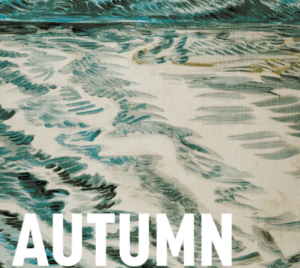
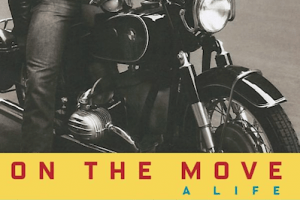
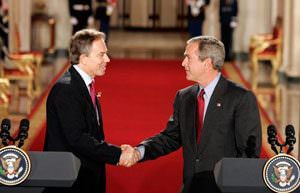

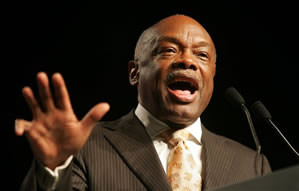
You need to be a supporter to comment.
There are currently no responses to this article.
Be the first to respond.